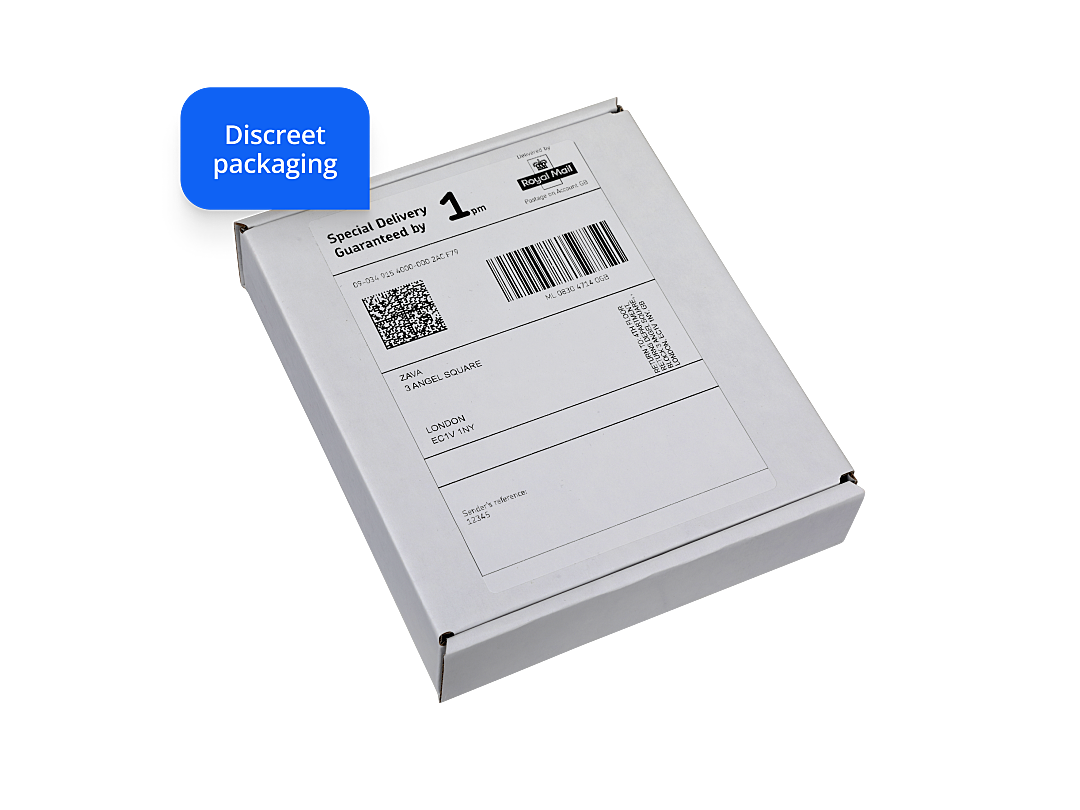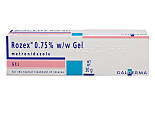Metronidazole Gel
Request Metronidazole gel online for rosacea with free, fast and discreet delivery
(1)



Prices from £20.00
In stock. Simply fill in a brief consultation questionnaire and one of our doctors will review your request today.
-
Metronidazole 0.75% gel is a topical medicine used to treat inflammation or reddening of the skin. It's an effective treatment for symptoms of the condition known as Rosacea.
Please note, when you request a generic (non branded) treatment, the product you receive may look slightly different than what we show on our website. The active ingredient in the medication will be exactly the same though. This is because we use a range of manufacturers to ensure we always have enough stock for patients. If you have any questions, you can message our Patient Care team or doctors through your account.
Prices
1 x 15 g - £20.00
1 x 30 g - £24.00
1 x 40 g - £26.00
2 x 40 g - £52.00
3 x 40 g - £78.00



About Metronidazole Gel
-
-
Rosacea is a skin condition that’s very common but not very well understood. It most commonly affects people on the face (cheeks, eyes and nose), neck and sometimes on the chest.
Most people with Rosacea will find that they experience it every now and then. Their symptoms will flare up for a few months at a time, disappear for a while, before recurring later on as another outbreak.
Rosacea isn’t contagious, and it isn’t known to cause permanent scarring. But it’s a chronic condition (it can last for a long time) which currently has no cure. With proper treatment, the symptoms of Rosacea can be treated and kept under control.
-
-
The most common symptoms of Rosacea are:
- flushing (your skin turning red for a few minutes)
- persistent patches of red skin (erythema)
- rough, dry or swollen skin
- thickening of the skin
- itchy, stingy or painful skin
- papules and pustules (usually associated with acne)
-
-
We still don’t know exactly what causes Rosacea. But, we do know that there are a number factors that commonly trigger or make people's symptoms worse. These can include:
- high stress levels
- extreme weather changes (hot and cold, wind, brightness)
- caffeine
- alcohol
- the menopause
-
-
Rosacea can affect anyone. However, it’s much more common in:
- people over 35
- women
- people with very fair skin
It doesn’t usually occur in children or adolescents.
If you think you or your child might have Rosacea, make an appointment your nurse or GP. They will examine your symptoms and talk to you about your medical history to make a proper diagnosis.
-
-
Unfortunately, there’s no cure for Rosacea. However, the symptoms of Rosacea can be treated effectively treated with the right medication. Treatments for Rosacea include:
- topical creams or gels (like Metronidazole 0.75% gel)
- oral antibiotics
- laser treatment
- self-help techniques (using mild or sensitive products, avoiding triggers)
-
-
Metronidazole 0.75% and Finacea (azelaic acid) gel are both topical gel treatments for the external symptoms of Rosacea. You use them in the same way, applying the gel to the affected areas of skin.
The biggest difference between Metronidazole 0.75% and Finacea (azelaic acid) is that Metronidazole 0.75% causes (on average) less side effects, but is also thought to be less effective.
-
-
Mirvaso is another topical treatment, however it's used specifically to treat people who have rosacea that presents more with flushing and erythema. Metronidazole gel should be used to treat rosacea if the main symptoms are papules and pustules (acne-like).
-
-
Soolantra is another, newer treatment used on the skin to help with the symptoms of rosacea. Some research shows that Soolantra is more effective than other, older rosacea treatments. Soolantra treats spots and inflammation of the skin, in a similar way to Metronidazole gel.
-
-
You would use Metronidazole 0.75% to treat any noticeable external symptoms of Rosacea, if they were bothering you or causing you discomfort. You should only use the gel if it has been prescribed to you directly, by a licensed medical professional.
-
-
Metronidazole 0.75% gel works by controlling the infection and inflammation in your skin, that can be caused by conditions like Rosacea.
-
-
It usually takes around 3 to 4 weeks before you’ll notice a change in your symptoms of Rosacea. If there’s no change in your symptoms by the end of 8 weeks, check with your nurse or doctor.
-
-
If it's used correctly, Metronidazole 0.75% is an effective treatment for Rosacea. It's especially effective in mild to moderate cases.
-
-
Yes, Metronidazole 0.75% can be used by any sex.
-
-
Metronidazole 0.75% gel should only be used by adults who have been prescribed it to them by a licensed nurse or doctor.
-
-
Metronidazole 0.75% isn’t recommended for children under the age of 12 years old. Don’t use Metronidazole 0.75% gel if you’re allergic (hypersensitive) to any of its ingredients. Check with your nurse or GP before using the gel if you’re pregnant or currently breastfeeding, as it may not be suitable for you to use.
-
-
The typical course of treatment with Metronidazole 0.75% is 8 weeks. However, the length of treatment will depend on your individual symptoms and medical history. Your nurse or GP will work out and let you know how long you should be using the gel.
-
-
Stop using Metronidazole 0.75% gel when your prescribing nurse or doctor tells you to, or if you experience any unpleasant or extreme side effects (like an allergic reaction). Usually you’ll see a significant improvement and can stop using Metronidazole gel after around 4 weeks, but you can use it for longer.
If your symptoms are not improved after 3 months, you should stop using it and talk to your GP about other possible options.
-
-
Keep your Metronidazole 0.75% out of the reach of children, don’t refrigerate, and never use it after the expiry date written on the packet.
-
-
Metronidazole 0.75% is a safe drug when you use it exactly as it has been prescribed to you by your nurse or doctor.
-
-
- Dry or irritated skin
-
-
- Allergic reaction (swelling of the eyes, face and throat, difficulty breathing)
- Dizziness, drowsiness or headaches
- Itchy or swollen skin
- Hives
- Nausea or vomiting
- Darkened urine
-
-
It’s possible for metronidazole to interact with alcohol, causing an unpleasant reaction. This could include headaches, nausea, weakness, or feeling confused. But, this is unlikely to happen with metronidazole gel, because very little is absorbed into the bloodstream.
Make sure you speak to your doctor before using Metronidazole 0.75% gel if you’re currently:
- undergoing haemodialysis
- taking a sedative known as phenobarbitone
- taking a medicine to prevent blood clots called warfarin type oral anticoagulants
-
-
Before using the gel, wash and dry your face. Apply about 1cm (0.5 inch) of the gel onto your fingers, and rub into the affected areas of skin.
Apply the gel twice a day (every morning and evening for 8 weeks), or until the course of treatment is complete.
-
-
Never increase your dosage without the approval of your prescribing nurse or doctor. Even if you miss a dose of your gel don’t use twice the amount next time. Over-using Metronidazole 0.75% could make your symptoms worse.
-
-
The active ingredient is metronidazole.
Other ingredients include: hydroxyethylcellulose, methyl parahydroxybenzoate (E218), disodium edetate, propyl parahydroxybenzoate (E216), sodium hydroxide, ethyl parahydroxybenzoate (E214), potassium dihydrogen phosphate, glycerol, and purified water.
-
-
Metronidazole 0.75% gel should only ever be applied externally, to the skin. Never use it on broken skin, or inside the mouth or eyes. Metronidazole 0.75% gel is sometimes called ‘Acea Gel’.

Dr Kathryn Basford is a qualified GP who works as a GP in London, as well as with ZAVA. She graduated from the University of Manchester and completed her GP training through Whipps Cross Hospital in London.
Meet our doctorsLast reviewed: 13 Jun 2019
-
How and when to take or use metronidazole, National Health Service [accessed February 2023]
-
Rozex® 0.75 % w/w Gel, Patient Information Leaflet, EMC [accessed February 2023]
-
Rosacea, National Health Service [accessed February 2023]
-
An update on the treatment of rosacea, Australian prescriber [accessed February 2023]
There are a range of gels and creams which can significantly reduce the symptoms of rosacea. While some treatments reduce inflammation and kill the bacteria that cause spots, others act on your blood vessels to reduce them in size and make them less noticeable.








